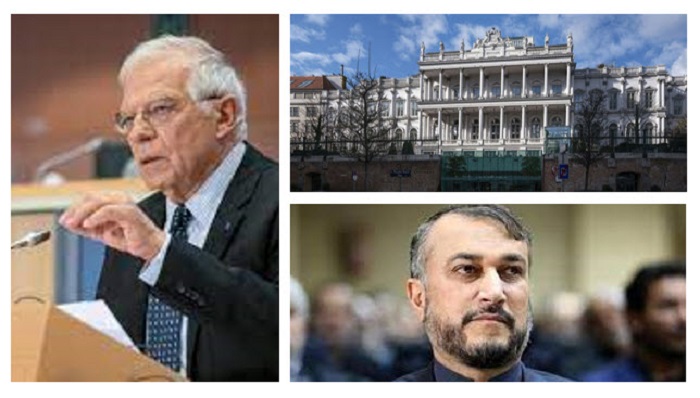
the outpouring of sanctions from multiple Western governments could indicate a broader shift in policy.
The Canadian government imposed new sanctions on 17 individuals and three other entities suspected of being directly involved in the attempted suppression of protests that have been ongoing for the past month since 22-year-old Mahsa Amini died after being assaulted by “morality police.”
Human rights-related sanctions
These measures were announced just one day after European Commission President Ursula von der Leyen delivered a speech to European Union ambassadors in which she declared that “the shocking violence inflicted on the Iranian people cannot go unanswered.” Later that day, the ambassadors in that meeting indicated that they had agreed to impose new human rights-related sanctions on at least 15 Iranian individuals and groups, though formal implementation of those measures is not expected until Monday, October 17.
Some have questioned the practical value of this ongoing accumulation of financial penalties, claiming that there is little reason to believe that any of their targets have assets or business dealings in Western countries that could be used to enforce their sanctions.
On October 17, while the EU foreign ministers met in #Luxembourg to announce new sanctions against the clerical regime in #Iran, supporters of the NCRI and the @Mojahedineng held a rally at Place de l’Europe to voice support for the #IranRevoIution.https://t.co/nMSLLja1ZK
— NCRI-FAC (@iran_policy) October 18, 2022
Sanctions from multiple Western governments
However, the outpouring of sanctions from multiple Western governments could indicate a broader shift in policy, leading to the adoption of more effective strategies over time. This possibility was emphasized on Thursday by US State Department spokesperson Ned Price, who stated that restoring the 2015 Iran nuclear deal was no longer the focus of White House policy.
Several commentaries had emerged in advance of that briefing, criticizing the US and its allies for sending mixed messages by pursuing negotiations with the Iranian regime while condemning Amini’s killing and the ensuing crackdowns on dissent, which have now killed more than 400 people, according to the People’s Mojahedin of Iran (PMOI/MEK).
Latest Sanctions Are Not Enough to Show U.S. Support of Iranian Protesters: the US Department of Treasury and State announced economic sanctions targeting Iran's "morality police" and seven individual security officials involved in suppression. #Iran #MEK https://t.co/NVvtfGOK4b pic.twitter.com/DNooBOoPrx
— masoud (@masoudlondon) October 15, 2022
Raisi accused the US and EU
Ebrahim Raisi’s administration appeared to mock the US over the disparity, with Deputy Chief of Staff for Political Affairs Mohammad Jamshidi claiming that the US had made “thirty-odd” requests for direct talks with the Islamic Republic.
Raisi spoke at an international conference in Kazakhstan, accusing the US of pursuing a “destabilization policy.” However, neither he nor any other prominent official attempted to explain how the US allegedly manufactured expressions of popular outrage in all 31 Iranian provinces and every major city.
The EU decided to sanction individuals and entities for their role in the death of #MahsaAmini and the violence inflicted on the Iranian people.
We stand with the brave women of Iran.Moreover Iran’s support for Russia’s war on Ukraine will be met with a clear answer by the EU https://t.co/DJHYHrwp4C
— Ursula von der Leyen (@vonderleyen) October 17, 2022
Month-long women-led protests
In the context of such a geographically and demographically diverse uprising, the official narrative of foreign meddling is facing some resistance from unexpected quarters, including former government officials and state-linked media outlets.
Former Parliament Speaker Ali Larijani, a prominent conservative politician, has called for a “cultural solution” to the veiling of women. Despite this, the Guardian newspaper in the United Kingdom declared that “the first cracks have begun to appear among Iran’s political elite over the country’s month-long women-led protests.”
We won‘t turn a blind eye to the brutal violence in #Iran. Women, Children and many others are beaten up for striving to live in peace and freedom. Further sanctions will target those responsible for the violence. @ABaerbock at 🇪🇺 #FAC. pic.twitter.com/uj2TzGsPDo
— Germany in the EU (@germanyintheeu) October 17, 2022
New Iranian Revolution
Almost a month into the new wave of uprisings, and on the verge of a spectacular change dubbed the “new Iranian Revolution” by many observers, it is clear that international support is both critical and insufficient. The clerical regime has learned a historic lesson by being built on the ashes of the previous monarchical dictator, and it will never abandon power at will.
Despite the most severe sanctions imposed in the last two decades, the regime has never neglected or weakened material support for its security forces. The bloody crackdown will only intensify and outpace international pressure as popular calls for change grow and continue to jeopardize the Supreme Leader’s rule.
#Iran is on the brink of change, and women play a major role in the current uprising against this misogynist regime that denies women’s basic rights#IranRevolution2022 pic.twitter.com/yAYaiwMNne
— Maryam Rajavi (@Maryam_Rajavi) October 18, 2022

